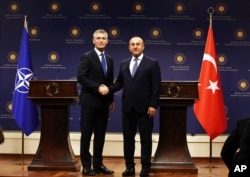Turkey’s decades-long bid to join the European Union hangs increasingly in the balance as criticism grows over an ongoing crackdown following July’s failed coup; but, Turkish President Recep Tayyip Erdogan is warning Brussels that Ankara is now ready to go its own way.
The EU parliament is set to deal another blow to Ankara’s membership aspirations, with the group Tuesday discussing a motion on whether to suspend talks. “Opposition against President Erdogan seems reason enough for people to be arrested, prosecuted or sacked from their jobs,” said Rebecca Harms, co-president of the parliament's Greens/EFA group in a statement ahead of the debate. “The EU needs to send a strong message that he cannot continue in this vein and should freeze the accession negotiations.”
Observers say the EU parliament will likely vote in favor of suspension on Thursday. The vote is only advisory, but analysts say Turkey’s EU bid is alive in name only.
“As Austria is openly against the continuation of the negotiations, they will veto any more progress on Turkey’s bid,” said Cengiz Aktar, a senior scholar at the Istanbul Policy Center. “All in all, de facto Turkey’s negotiations are over, but Turkey’s rulers don't care.”
Erdogan's view
Earlier this month, Erdogan called on the EU to make up its mind as to whether to continue with Turkey's membership bid, suggesting he was not bothered one way or another. “Turkey must feel at ease," Erdogan told reporters on Sunday while flying back from a visit to Uzbekistan. "I must say for me it's not the European Union at all costs. That's my view."
Turkey's future, he suggested, may lie in the East: “I think if Turkey were to join the Shanghai Five, it will enable it to act with much greater ease.”
The Shanghai Five, now formally known as the Shanghai Cooperation Organization (SCO) is primarily a security bloc made up of Russia, China, and the central Asian nations that include Kazakhstan, Kyrgyzstan, Tajikistan and Uzbekistan. On Monday, Chinese Foreign Ministry spokesman Geng Shuang welcomed the idea of Turkish membership; but, analysts warn that Ankara’s bid would almost inevitably be incompatible with Turkey’s NATO membership aspirations.
Turkey’s pro-government media have been awash in positive discussions of possible SCO membership. However, analysts are questioning the viability of such a membership bid, given the Islamist roots of Turkey's ruling AK Party and the country's president. “The top priority of the SCO is to prevent Islam from taking hold of any of its members," said Aktar.
Domestic politics may be the driving force behind Erdogan’s statements.
“For him, the utmost priority is to design a campaign that would allow a large enough majority in Turkey to back the presidential system,” said Sinan Ulgen, a visiting scholar at Carnegie Europe in Brussels. Erdogan for months has been courting Turkey’s largest nationalist voting constituency ahead of an expected referendum on a presidential system early next year.
Turkish warnings
With Erdogan warning of a showdown with the EU by year's end, there is growing unease. “Even Islamist commentators are expressing doubts," said Semih Idiz, a political columnist for the Al-Monitor website and Hurriyet daily newspaper. "They say it's good to show the EU we have alternatives, but they are aware that Turkey's future does not lie with an organization, one of whose essential objectives is keeping Islamic fundamentalism at bay.”
Deputy Prime Minister Mehmet Simsek also voiced concern earlier this month, warning Turkey would become a “Third World country” if its EU bid ended. “In my last visit to Japan, many questioned whether Turkey would become severed from the EU," Simsek told an Istanbul business gathering. "If so, we will not be in Turkey.”
Forty-four percent of foreign direct investment in Turkey originate from EU countries, which also purchase 66 percent of Turkish exports. There is nothing to be gained from ending the negotiations” over Turkey's EU bid, said Ulgen.
An end to those negotiations would mean an end to Brussels' scrutiny of Turkish affairs. Erdogan has warned that the crackdown which began after July’s failed coup could last more than a year. On Tuesday, another 15,000 state workers were fired by decree, bringing to 110,000 the total number of people removed from their jobs since the introduction of emergency rule.
Erdogan is also pressing to reinstate the death penalty, which Brussels has warned would automatically lead to a suspension of talks. Columnist Idiz warns a break with the EU would have far-reaching consequences for Turkey, threatening to end its nearly two-century-long orientation toward Europe.
“If Turkey did move in that direction, it would represent (a) deterioration economically, politically (and) socially, because the landmark benchmarks would no longer exist," he said. "We would not know what the direction of this country would be. We would not have the anchor (that) the EU and the relationship with Europe have provided for quite a long time."





